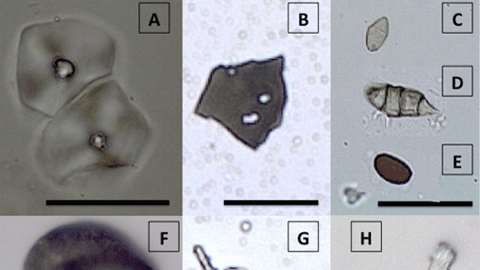The REAL Paleo diet: Big brains needed carbs

27/08/2015
The study challenges the long held belief that acceleration in human brain size from around 800,000 years ago was the result of increased meat consumption. Instead, by combining perspectives from a range of disciplines including human genetics, archaeology, anthropology, physiology, and nutrition, the researchers show that the high glucose demands of our big brains would most easily have been met on a high carbohydrate diet.
Until now, there has been a heavy focus on the role of animal fats and protein in the development of the human brain over the last two million years. The importance of carbohydrate, particularly in the form of starch-rich plant foods, has been largely overlooked. But the human brain uses up to 25 % of the body’s energy budget and up to 60 % of blood glucose, and starchy carbohydrates are the richest form of dietary glucose. Human pregnancy and lactation, in particular, place additional demands on the body’s glucose budget, along with increased body size and the need for mobility and dietary flexibility.
“Global increases in obesity and diet-related metabolic diseases have led to enormous interest in ancestral or ‘Palaeolithic’ diets,” said co-author Professor Jennie Brand-Miller from the Charles Perkins Centre, University of Sydney.
Karen Hardy, a researcher with ICREA, the Catalan Institution for Research and Advanced Studies at the Universitat Autònoma de Barcelona and co-author, said “We believe that while meat was important, brain growth is less likely to have happened without the energy obtained from carbohydrates. While cooking has also been proposed as contributing to early brain development, cooking carbohydrates only makes sense if the body has the enzymic equipment to process these.”
The researchers also point to increases in the number of salivary amylase genes in modern humans, which increases the amount of amylase produced in saliva. Kate Brown, a PhD candidate at University College London, and co-author on the study, said “While other primates have only two copies of the salivary amylase gene, modern humans have an average of around six, and this leads to more salivary amylase and more efficient starch digestion. We don’t know exactly when the number of copies multiplied, but genetic data suggests it was in the last million years; a timeframe that brackets archaeological evidence for cooking. This is particularly interesting because cooking makes starches easier to digest, often by some considerable margin. There are still uncertainties about when salivary amylase genes multiplied, and when humans began cooking, but the combined benefits – especially for fuelling our increasingly glucose-hungry brains – are difficult to ignore.”
Les Copeland, of the University of Sydney says “We believe that dietary carbohydrates, along with meat, were essential for the evolution of modern big-brained humans. The evidence suggests that Palaeolithic humans would not have evolved on today’s so-called ‘Paleo’ diet. After cooking became widespread, starch digestion advanced and became the source of preformed dietary glucose that permitted the acceleration in brain size.”
Starches would have been readily available to early human populations in the form of tubers, seeds and some fruits and nuts, and in another study, Karen Hardy and colleagues recently found evidence that seeds and nuts were being eaten by hominins around 400,000 years ago. In terms of energy supplied to an increasingly large brain, increased starch consumption may have provided a substantial evolutionary advantage.
According to the researchers, a diet similar to that which gave us our large brains in the Palaeolithic era should be positive for human health. Mark Thomas, professor of evolutionary genetics at University College London, and co-author on the study, said “One of the biggest problems in the study of human evolution is understanding how and why we evolved such massive brains. The advantages today may seem obvious, but they come at considerable evolutionary costs: our big brains are obscenely glucose-greedy; they have made newborn infant heads so big that we effectively try to kill our mothers when we are born; and big brains take a long time to develop – which means we spend less time reproducing.
“None-the-less, and to a first order of approximation, our physiology should be optimised to the diet we have experienced in our evolutionary past. This could help us to better define healthy diets. The problem is we don’t know exactly what our ancestral diets were, and previous attempts to define them have underplayed the importance carbohydrate. But by piecing together our glucose needs for our big brains, gestation and lactation, together with the availability of starch-rich foods in the past, the earliest evidence for cooking and its effects on starch digestibility, and the evolution of multiple copies of our salivary amylase genes, we believe there is a compelling case for starchy foods playing a critical role in shaping what we are today, big brains ‘n all.
Journal Reference: Karen Hardy, Jennie Brand-Miller, Katherine D. Brown, Mark G. Thomas, Les Copeland. The Importance of Dietary Carbohydrate in Human Evolution. The Quarterly Review of Biology, 2015; 90 (3): 251 DOI: 10.1086/682587